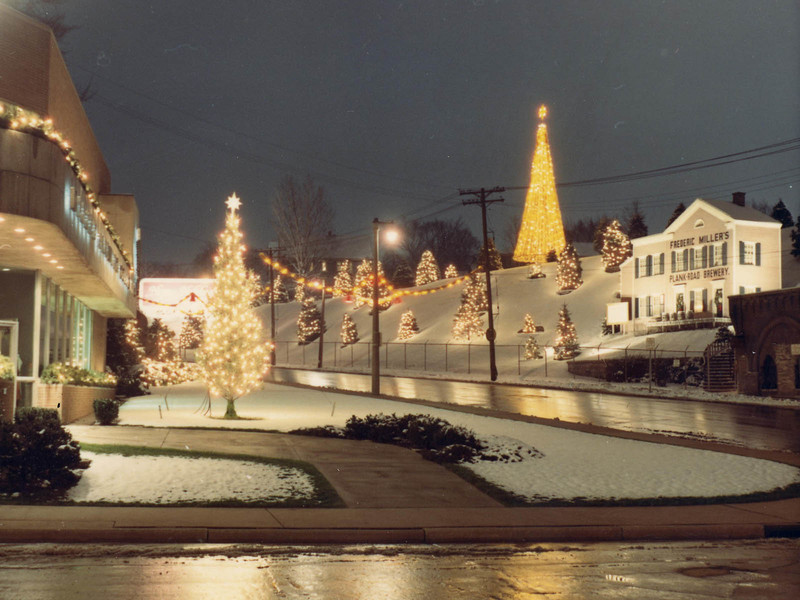In a 1931 newspaper article, an unnamed reporter wrote, "The other day Clarence Kossow said, ‘this is my father’s birthday.’ His father -- he smiled as though confident the name would explain everything -- his father was John Kossow. It was in 1899 that his father was killed."
Well, today is the 115th anniversary of the day Big John Kossow was bludgeoned to death, making him the second police officer murdered on the job. (The first, Frank Piszczk, was shot on 2nd and Florida in Walker’s Point in 1884). And, all these years later, the name no longer rings a bell in Milwaukee.
The story came to my attention when my friend, architect Keith Stachowiak, dropped off a manila envelope with photos and newspaper clippings and asked what I thought he ought to do with them.
The envelope contained three old photos of Kossow -- including one with a group of policemen taken in 1896. There were also some old articles, including one from the Oct. 1, 1899 edition of the Milwaukee Sentinel, held together by tape.
"I got it from a rummage sale in Franklin," Stachowiak told me. "She said she took care of John Kossow (junior) late in his life, and that he didn't have a next of kin, that she knew. She held on to a lot of his possessions after he passed but just didn't know what to do with them anymore. After showing interest and buying a couple other things from her, she just gave these to me."
The articles -- which, along the photographs, Stachowiak will offer as a donation to the Milwaukee Police Historical Society -- tell the nuts and bolts of the story.
Shortly before noon on Saturday, Sept. 30, 1899, Officer John Kossow -- reportedly well-known and well-liked on his South Side beat, where they called him "Big John" as a nod to his towering 6-6, 250-pound frame -- went to the home of Herman Mueller on 25th and Orchard after he was alerted to a domestic dispute.
Mueller, a 42-year-old tanner who had arrived from Germany nearly a decade earlier and earned $10 a week as a night watchman at Pfister and Vogel, had returned home at about 7:30 a.m., drunk, and argued with his second wife, in whose home the couple lived, along with their children, about a broken bed.
Mueller apparently brandished a large butcher’s knife and threatened to kill himself (and perhaps his wife, though he later denied both) before kicking over a stove and setting fire to some straw in the basement (it was 1899), which was extinguished. According to a newspaper report on the inquest, Mueller later said he'd been amusing himself "by pulling out wisps of straw and lighting them, although he had no intention of trying to set the house on fire."
By the time Kossow arrived, and was warned by Mrs. Mueller that it really would’ve been better had he arrived with a partner, Mueller was either asleep in a chair or, as his 11-year-old son later testified, pretending to sleep. Kossow put a hand on Mueller’s shoulder, setting him off.
Before Kossow knew it, the 6-2, 165-pound Mueller was up and on him. The two tussled around the house, choking one another, moving from room to room, knocking over furniture, and when, while in the kitchen, Kossow’s billy club fell, Mueller snatched it up and began to beat Kossow over the head. The officer fell, but Mueller continued his assault on the now prostrate policeman.
As he lay dying beneath Mueller’s blows, Kossow is said to have appealed to his murderer’s humanity, saying, "Du bist doch ein mann?" (Surely, you are a man?)
So violently did he pummel Kossow that the Sentinel luridly reported that "the head of the patrolman was literally battered to pieces."
A neighbor saw Mueller flee with the club, fetch a bicycle and ride off. He entered the house and found Kossow moaning, near death.
Mueller, meanwhile, rode far and wide. While police responded to his home and quickly sent word out around town to be on the lookout, he headed west on National Avenue as far as the "West Milwaukee shops" and then north to Grand Avenue, where on 30th Street, two officers found Mueller walking his bicycle.
Mueller was apprehended quietly and without incident, allowing police to search him, and was found to be unarmed, though his pants were bloodied and he had a cut on his scalp.
The next day the Sentinel reported, "few members of the Milwaukee Police department were better known or better liked than John Kossow."
Born in 1864, Big John was appointed to the MPD in 1890 and worked for about five years in "the bad lands," between 3rd and 7th Streets, Grand Avenue north to Cedar (now Kilbourn). He transferred to the South Side, where he lived with his wife and three children (John Jr. would later become the fourth), in spring 1899 and his beat ranged from Muskego on the east to 27th Street, then the city’s border, on the west, Greenfield Avenue south to Lincoln.
The Sentinel reported that Kossow, "not only had a splendid physique but he also possessed a cool head and had undaunted courage. On account of his great height Kossow always carried the banner when the police department was on parade."
Though Mueller initially appeared to confess, during a coroner’s inquest on Monday, he testified that he was assaulted first by Kossow and at a preliminary hearing on Wednesday at which he was held without bail and charged with murder, he pleaded not guilty.
Meanwhile, on Tuesday, Kossow was laid to rest at Forest Home Cemetery, attended by Police Chief John Janssen and a platoon of policemen.
Mueller was tried a few weeks later and found guilty and served 13 years at Waupun.
John Junior, who would’ve been about 2 when his father died, probably had few memories of his dad. But perhaps more than his little brother Clarence, the one who spoke to that anonymous reporter in 1931.
Clarence was born about a month after his father was killed.
Born in Brooklyn, N.Y., where he lived until he was 17, Bobby received his BA-Mass Communications from UWM in 1989 and has lived in Walker's Point, Bay View, Enderis Park, South Milwaukee and on the East Side.
He has published three non-fiction books in Italy – including one about an event in Milwaukee history, which was published in the U.S. in autumn 2010. Four more books, all about Milwaukee, have been published by The History Press.
With his most recent band, The Yell Leaders, Bobby released four LPs and had a songs featured in episodes of TV's "Party of Five" and "Dawson's Creek," and films in Japan, South America and the U.S. The Yell Leaders were named the best unsigned band in their region by VH-1 as part of its Rock Across America 1998 Tour. Most recently, the band contributed tracks to a UK vinyl/CD tribute to the Redskins and collaborated on a track with Italian novelist Enrico Remmert.
He's produced three installments of the "OMCD" series of local music compilations for OnMilwaukee.com and in 2007 produced a CD of Italian music and poetry.
In 2005, he was awarded the City of Asti's (Italy) Journalism Prize for his work focusing on that area. He has also won awards from the Milwaukee Press Club.
He has be heard on 88Nine Radio Milwaukee talking about his "Urban Spelunking" series of stories, in that station's most popular podcast.







